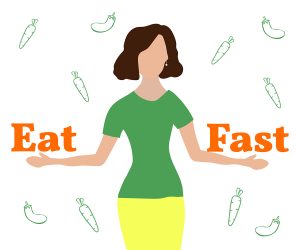 Active seniors who often struggle with weight and those who want to prevent chronic diseases should consider intermittent fasting for health. Why is fasting such an important health-promoting strategy? Let’s look at what happens when you take a break from eating for 14 to 16 hours (a type of fast called intermittent fasting).
Active seniors who often struggle with weight and those who want to prevent chronic diseases should consider intermittent fasting for health. Why is fasting such an important health-promoting strategy? Let’s look at what happens when you take a break from eating for 14 to 16 hours (a type of fast called intermittent fasting).
This may seem to be a fad like so many diets you find on the Internet. Many articles address the efficacy of fasting to lose weight, ignoring the effects on cellular health. But let’s look at the facts from a purely scientific perspective. Not eating is a natural way for cells to cleanse and detoxify, to trigger regeneration, and to get rid of accumulated debris from metabolic processes. For seniors, fasting may be a key strategy for longevity.
How Fasting Works to Promote Good Health
Essentially, going without food is a positive stressor on your body. It is similar to rigorous exercise that tears down muscle and rebuilds it to become stronger. To learn more about how it can benefit seniors, I turned to Dr. Joseph Mercola and his book Ketofast. Here are the mechanisms of fasting that are beneficial.
- Reduces insulin resistance: Fasting is one of the most effective ways to restore normal sensitivity to your insulin receptors.
- Autophagy: This is the amazing way that your cells will “eat themselves” to get rid of damaged cells and recycles the more youthful components. Autophagy is also the process that destroys foreign invaders such as viruses, bacteria, and other pathogens. Another process is apoptosis when the entire cell is recycled. Without this mechanism, your risk of cancer increases because damaged cells start to replicate.
- Detoxification: Most of us have experienced a lifetime of exposure to toxins from food and our environment. Most of these are stored in fat cells in our bodies. Fasting is one of the most potent ways to remove toxins from your body.
More Reasons to Boost Health with Fasting
- Circadian Rhythms: Your body’s internal clock regulates nearly every process in the body and when it is disrupted, a cascade of negative effects can happen. When you take a break from eating, you reset your circadian clock.
- Gut health: This is my favorite. Fasting gives your digestive system and gut flora a chance to reboot. This is important because your immune system is controlled by the health of your digestive system. Increasingly, there is more evidence that our moods and mental health are co-dependent with our gut microbiome.
- Weight Loss: Not surprisingly, fasting helps boost weight loss. It also lowers insulin levels so your body is no longer receiving the signal to store extra calories as fat.
- Brain Function: When you don’t eat, your body will burn up your glucose reserves in your blood and liver, and then the liver will turn fat into ketones and start using them for fuel. Your brain and heart actually prefer ketones over glucose for fuel as they produce fewer harmful reactive oxygen species (ROS). Your brain will work better and improve your ability to think and learn.
- Heart Function: Your heart cells can use fats, carbs, ketones, and amino acids for their high energy needs. Ketones have a fine-tuning metabolic role that optimizes heart performance and protects the heart from inflammation and injury.
Try Intermittent Fasting for Cellular Health
Fasting supports your body’s innate maintenance and healing systems. Most of the magic of fasting occurs during the refeeding phase after you’ve activated your stem cells and targeted damaged subcellular structures for removal with autophagy.
This isn’t difficult to do, providing you are willing to stop eating after dinner and not snack for three hours before bedtime. For example, if you finish eating at 7 p.m., you would delay your first meal the next day 14-16 hours. That would be at 9 a.m. or better still, 11 a.m. You’re allowed coffee or tea, as long as you don’t use sugar or milk. Heavy cream and stevia are okay, as they don’t stimulate glucose levels.
Of course, like any diet shift, it’s not advised if you’re underweight, have a chronic disease, or are pregnant, etc. Always check with your health professional. Three experts in intermittent fasting are Dr. Mercola, Dr. Valter Longo and Dr. Jason Fung who’ve written several books on fasting and cellular health.

I am 71 and I’ve been practicing intermittent fasting (16:8) for a few years now. I also avoid sugar and eat fruits, vegetables and whole grains. I appreciate your web page because it addresses seniors’ needs.
I am 91and have returned to IF in recent years. Mostly it is 16/8 but once a week I do 20/4. It has helped with my weight and exercise and walking play a big role. All would be even better if our home were free of the temptations of sweets but you can’t have everything.
I’ve just started IF (15/9), about 3 weeks ago per my granddaughter’s suggestion. Have lost about 5 lbs. and really do not feel hungry most of the time. I’m 78 and pretty active 7 days per week, 30 minutes of walking and/or strength training with 5 lb weights. Going to try the 16/8 beginning tomorrow.